
13 minute read
Why be a teacher?
Wendy Griffiths, Headmistress, talks about this invaluable role and offers her experience and insights.
When I started my career, I remember pupils regularly asking why I had become a teacher. Many seemed surprised that it would be a conscious choice for graduates. Their other focus was a genuine belief that teaching must be boring, as our role was simply to deliver the same information on an annual basis.
I recently asked the teachers at Tudor to indicate whether teaching had been their chosen direction when they were at school. Approximately two thirds,
myself included, had not seen themselves pursuing a career in education. This can, in part, be put down to the lack of clarity of direction which is true for a lot of young people when they are at school, but I am also convinced that it was also because we did not truly understand what it meant to be a teacher.
The most important factor in being a successful teacher is the ability to build a rapport with your students and, as no two pupils are the same, the number of different experiences and challenges are infinite. There is a scheme of work to be covered, but anyone who thinks that a ‘one size fits all’ delivery is the way forward will not survive for very long. For many, like me, this is what makes the job fascinating. Having the opportunity to work with young people as individuals and to see them develop academically and personally – all requiring different support, a variety of stimuli and personalised direction – can be demanding, but provides ‘job satisfaction’ on a daily basis. It is certainly never boring.


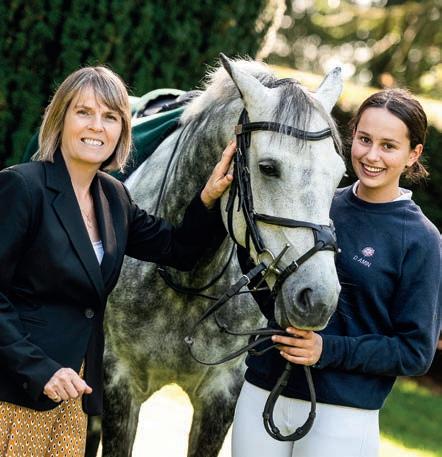
The other aspect of teaching that so many people fail to understand is that a huge part of what we do does not happen in lessons. Everyone understands the work that takes place behind the scenes in terms of planning, assessment and reporting, but it is what the individual teachers do outside their teaching responsibilities that guides the development of the person. The hours spent working with the cast of the

play, training the debaters, the weekends supervising Outward Bound, the one-to-one sessions to build the academic confidence of a child and, as a consequence, their self-belief; this is where magic is performed.
Many of the young people that I have taught and known have become teachers and some of their insights and stories are shared in this magazine. They, too, will have been asked why they chose teaching and undoubtedly there may be moments in the early days where they have wondered the same. If anyone asks them in the future, they might like to use the short but expressive dialogue between Sir Thomas More and Richard Rich from Robert Bolt’s A Man for All Seasons, which I have quoted many times in assemblies:
“Sir Thomas More: Why not be a teacher? You’d be a fine teacher; perhaps a great one.
Richard Rich: If I was, who would know it?
Sir Thomas More: You; your pupils; your friends; God. Not a bad public, that.” R


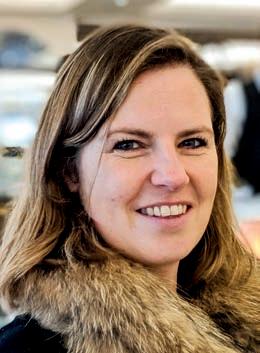
Nicola Cornish (1994) Deputy Head Academic, Prep school
Throughout my time at Tudor, a career in teaching had always interested me. I was a Todd Prefect and particularly enjoyed working with this year group during their very formative year at school. During the Upper Sixth, I applied for business courses at various universities and thought I would go back to teaching at a later stage, however I couldn’t quite find a course that appealed to me – I think teaching was always in the back of my mind. I literally woke up one morning and said, “Right, that’s it, I am going to apply for teaching courses”. So that’s what I did. I gained a place at the University of Northumbria, where I completed a three-year degree in Primary Education with Qualified Teacher Status. I absolutely loved the course, in spite of the daily 9:00am starts! Over the three years, I undertook many placements in local primary schools. These were eye-opening experiences, which made me really appreciate the education I had received at Tudor and encouraged me to strive to offer the children I worked with - both during those placements and now – the enthusiasm, care and support that I received during my schooling.
My teaching career started at Garden House School in London as a Year One class teacher and over the next twenty years I taught all ages from Year One to Year Six. After about six years of teaching, I applied to be the Science Coordinator. In this role I oversaw the teaching of science within the school and led the development of the science curriculum. From there I moved to Key Stage One Director of Studies, overseeing all the teaching and learning in the lower part of the school. I now hold the position of Deputy Head Academic across the whole school.
What I love about teaching is that no day is ever the same and you have no idea who or what is going to come through your door that day – it might be a wonderful poem that a child has written, inspired by an assembly you have just done, a piece of mathematics that is all correct when the pupil had been struggling to grasp a concept, or even a birthday cupcake! I now have extra responsibility in helping to place our children in their senior schools, which means dealing with a lot of parents and supporting them and their children through what is a very demanding time for them. The hours are long, but it is honestly the most rewarding job in the world. Nothing beats the feeling of seeing a child’s face light up having finally cracked a challenge, be it on the sports field, in the classroom or, simply tying their shoelaces. You certainly need passion, patience and a good sense of humour, but it is a wonderfully fulfilling job.

Henrietta MacLennan (Martin Smith, 2005) Head of Sixth Form & Secondary Classics
I wouldn’t say that I had always dreamed of being a teacher; in fact, I don’t think it was something I’d even considered when I left school. An internship in an investment bank in Athens during the summer of my second year at university very clearly ruled out any
previous aspirations to work in finance, and by the two year period, working closely with the tutor team time my friends began job-hunting in earnest in our to ensure students had opportunities to identify and final year, the only ‘next step’ I was considering was a pursue their interests and also supporting students PGCE. If I were to teach, I knew I wanted to teach in the in the Sixth Form with special educational needs in state sector and thought that I would be more likely mainstream education, particularly ASD students. to find a post in a history department than a classics one, so initially expressed an interest in a history PGCE Alongside this, I was also part of the Prince’s Teaching course, but I was then firmly steered to the classics Institute, for whom I co-developed, designed and led PGCE by one of my teachers who ran the course. Once I residential courses for state school classics teaching as had a foot in the classroom, I never looked back. part of their Schools’ Programme. This mirrored what we were trying to achieve in schools, but for teachers; this I began teaching at Saffron Walden County High School, time, reigniting as opposed to finding, teachers’ subject a large comprehensive in North Essex, as a lone Latin passions and helping to identify ways to integrate this and classics teacher. The students were fantastic: into classroom teaching. The residential courses have interesting and interested. Within been highlights of my career – they two years, we had enough uptake to hire another specialist Latin teacher and the department grew. Whilst I
The desire to get students to love
fostered an excellent network of classics teachers in state schools, all of whom were committed was teaching Latin throughout the school, I was also teaching classical civilisation at A Level, so the majority
the Classical world and to help them
to widening access to classical subjects in the state system. I remain very aware of the difficulties of my teaching timetable was filled with Sixth Form students. This really clarified for me where my more
identify their future pathways
that state schools have in recruiting classics teachers, as well as the shortage of jobs for classics teachers specialist interests in teaching lie; working with Sixth Formers to help them identify their next steps. From
remain both the motivations for, and
in the state sector. Of course, the two are entirely linked; however, it appears that an impasse has been there, I moved into the Sixth Form tutor team, where I had a group of forty-five Year 12 and 13 students
the satisfactions of, my job.
reached, and without a greater demand for teachers, there will be no increase in teacher training under my care. Finding out what places, and vice versa. This remains Year 12 students want to study and what they hope to a source of great frustration; access to the classical achieve, then working with them to find out how to get world for children nationally is being restricted. there over their two years in Sixth Form, is one of the most rewarding aspects of my job to this day. After five years teaching at Mossbourne, the birth of our first daughter and a house move, I became a classics After four years at Saffron Walden, I moved teacher at St Augustine’s Priory, an independent to Mossbourne Community Academy, a large Catholic girls’ school in Ealing: a big change from my comprehensive academy in Hackney, in a role very previous experience in comprehensives. However, it also similar to my previous role, leading and developing a feels extremely familiar: the desire to get students to classics department whilst also having an enhanced love the classical world and to help them identify their role with the Sixth Form. I was the Senior Tutor there, future pathways remain both the motivations for, and preparing prospective early applicants (Oxbridge, the satisfactions of, my job. Following the birth of our Dentistry, Medical and Veterinary students) over the second daughter, I have returned to work as Head of the
Sixth Form, which also brings an added level of strategic challenge to my role, which I am thoroughly enjoying. Working with young adults often doesn’t feel like work. The dynamism and determination of girls in breaking through into so many different spheres is particularly special – girls in STEM, in politics, in industry. It is a very exciting time to be a part of girls’ education.
Regardless of the location, the school, or the context, one thing stands out above all others as to why I teach: my days are spent standing in front of interesting young people, talking to them about (hopefully) interesting things and finding out very interesting things about them. No two students, lessons or days are the same and I hope that in ten years’ time, that will still be the case. ticked the box for me in terms of keeping my options open.
However, I didn’t expect that I would love teaching as much as I do. This has given me the confidence to remain in teaching and to broaden my horizons as much as possible within the sector.
Since qualifying as a teacher, I have taught in a range of schools. My first two years in Hounslow were tough and eye-opening, however, I soon fell in love with the busy days, challenges and many rewards you get from working with children. I have since gone on to work at Knightsbridge School where I have been a teacher for the last four years.
Emily Taylor (2012) Early years
Antonia Harington (2010) Teach First
Like many of my friends at Durham, I had no idea what I wanted to do after I left university. All I knew was that I wanted to do something fun and interesting that would keep my options open in the future. That’s when I came across Teach First.
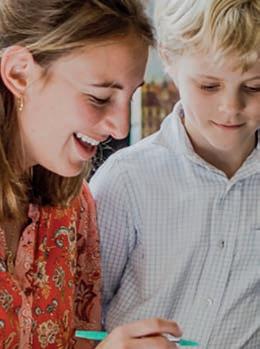
I saw an advert for Teach First and was really taken by the prospect of learning a new skill that I might enjoy and that would, perhaps, be a good stepping stone into a future career. I saw that many people go on from Teach First into other careers beyond teaching, which
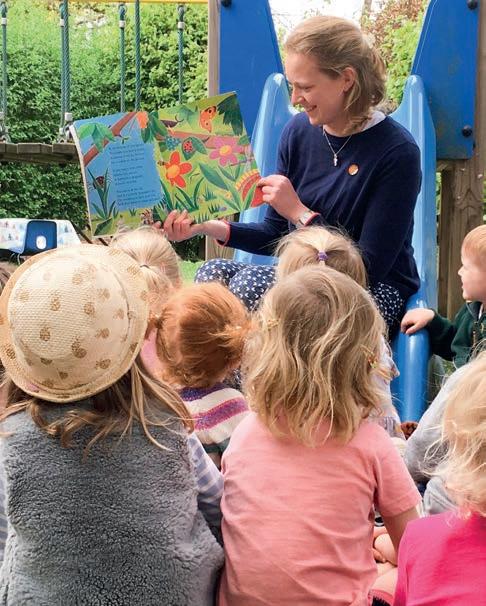
I have always wanted to be an early years’ teacher, due to the excitement of working with young children as they learn through their play and explore the world around them. So, after leaving Tudor Hall, I went on
to study Early Childhood Studies at the University of Gloucestershire. During these three years I completed many placements and, upon leaving, I was delighted to be offered my first teaching position in the Nursery at Carrdus School.
I feel Carrdus really captures the individual child - they are all unique - and the school itself has a strong emphasis on outdoor learning, which is something I feel very passionate about. The five years I have spent teaching at Carrdus have been truly lovely and I will always be grateful for my time here. I made the almost impossible decision to leave at the end of this school year, as I feel it’s time for me to explore the world of teaching a little more: I never took a gap year and hope to spend some time volunteering in Africa and working in New Zealand, learning more about their education system. I still want to make a difference, inspire and encourage young people, and hope to have the opportunity to support children less fortunate than myself from all areas of the world in the next chapter of my teaching career.
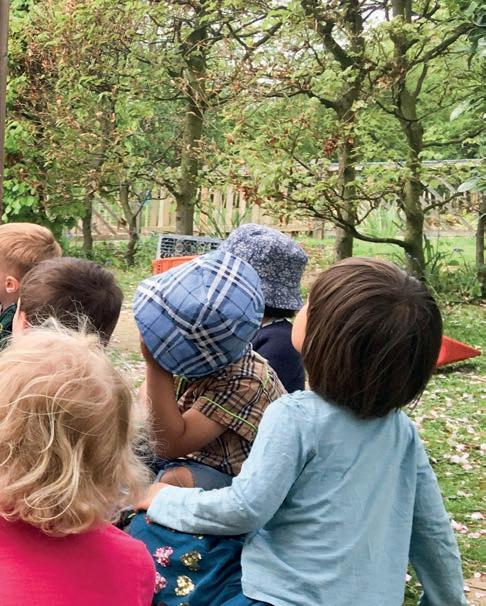

Eliza Lindsay (2015) Secondary Science
I decided to become a teacher at the start of my third year at university. With graduation looming, I was weighing up a few options of what to do next, teaching being one of them. I had always enjoyed tutoring friends at school and working with young people, so ultimately teaching felt like the perfect option.
My degree was in Marine Biology and I chose to teach at secondary level so that I could specialise in biology (in primary you teach by year group, rather than by subject). When training as a science teacher, you actually train to teach all three sciences, so for the past year I have been teaching biology, physics, and chemistry in a large state school in Newcastle.
It has certainly been challenging at times, but working in this school has given me such a broad experience, from teaching physics (sorry Mr Robinson!), to behaviour management (my largest class is twentynine students), and being a Year 10 form teacher. One highlight from this year was when British fashion model Adwoa Aboah (whose mother is OT Camilla Aboah (Lowther, 1977)) came to speak at school about mental health, something that is so important to me. It was amazing seeing the students engage with it and open up about their struggles. However, things like that are rather exceptional. On a day-to-day basis, there really is nothing better than the lightbulb moment when a student who has been struggling finally understands what you are explaining to them. I feel lucky to work in a role where I am able to support students working towards their GCSEs and A Levels – I remember the pressure of those years myself. R










